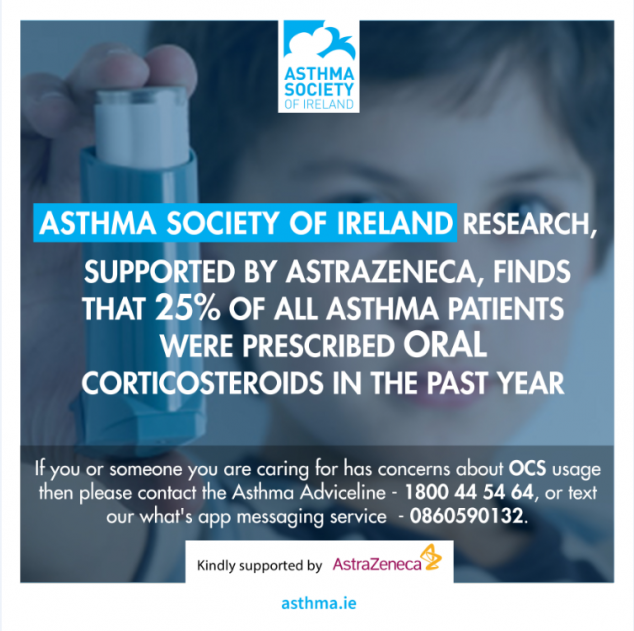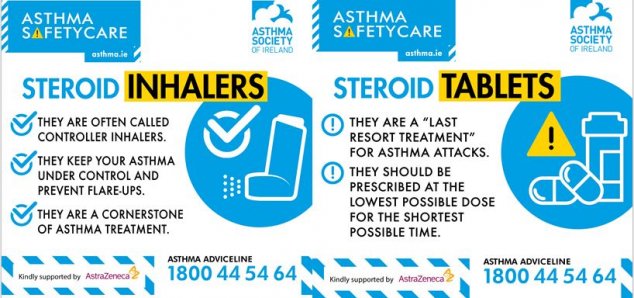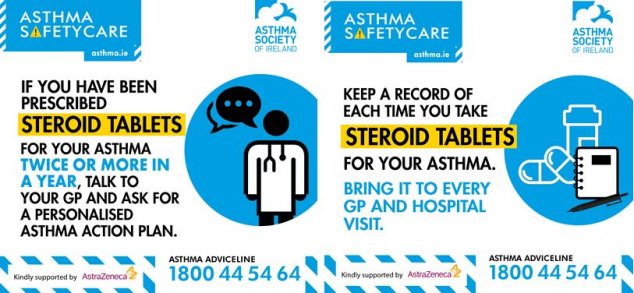Steroid tablets (Oral Corticosteroids) for Asthma – What You Should Know
What are Oral Corticosteroids?
Oral Corticosteroid is a medical term for steroid tablets. They are an anti-inflammatory medicine – in other words, they reduce the swelling in the lungs that causes asthma symptoms. They are prescribed for a wide range of conditions, including asthma and COPD.
They are typically prescribed for one of two purposes in asthma
- short courses are commonly used to treat asthma attacks (by far their most common use in asthma)
- or they can be prescribed as ongoing daily maintenance therapy for a small number of patients with severe asthma.
One of the key goals of asthma treatment is for asthma to be well controlled. Repeated courses of steroid tablets may be a clue that your asthma is not under control and your treatment plan needs to be reviewed. In some cases, where repeated or continuous steroid tablet treatment is required, you may need to be referred by their GP for specialist review as you may have undiagnosed severe asthma.

The difference between steroid tablets and your controller inhaler containing steroids
Oral Corticosteroids come in tablet form. Inhaled Corticosteroids come in an inhaler.
Steroid inhalers contain a different steroid to steroid tablets.
Steroid inhalers are prescribed by your GP for regular use to keep your asthma under control and are an essential aspect of asthma maintenance.
Steroid inhalers deliver the steroid directly to the lungs. They do not involve the risks associated with steroid tablets. Steroid inhalers reduce the risk of asthma deaths, hospitalisation and asthma attacks requiring steroid tablets and usually have little or no side effects, if used correctly and as prescribed.
Oral corticosteroids can be a quick and effective tool for treating asthma attacks, but can also lead to harmful, sometimes long term, side effects. They should be prescribed at the lowest effective dose for the shortest possible time. Unnecessary use or over-use of the treatment can cause more harm to the patient than good.

What are the risks and side effects in taking oral steroids for asthma?
Harmful effects are associated with both short-term use and long-term use of steroid tablets (Oral Corticosteroids).
Harmful side effects from short term use of steroid tablets include:
- Sleep disturbance
- Reflux
- Appetite increase
- Sepsis and increased risk of infection
- Mood changes
- Fracture
Harmful side effects from prolonged or frequent use include:
- Cataract
- High blood pressure
- Diabetes
- Depression
- Osteoporosis
If you have been prescribed steroid tablets
Steroid tablets can be prescribed when an asthma attack or increase in asthma symptoms occurs and can help to prevent hospitalisation and death. For a small proportion of patients with severe asthma, prolonged treatment with steroid tablets may be used as daily maintenance therapy.
Do not stop steroid tablet therapy without talking to your doctor first as doing so could be dangerous.
The Global Initiative for Asthma has stated that if you experience two or more asthma attacks in one year requiring Oral Corticosteroids, it is likely you do not have your asthma under control. You should seek an appointment with your doctor to review your asthma treatment and create a personalised asthma action plan.
During this review, the GP may check if you are using your inhaler effectively, if you have been exposed to seasonal viruses or if there are other factors such as dust, cleaning chemicals or air pollution triggering your asthma.
If you are not taking your steroid inhaler treatment every day, you may experience an asthma attack or flare-up that will require treatment with steroid tablets.
The best way for people with mild to moderate asthma to avoid needing steroid tablets is to take your controller (or combined) inhaler medication every day - even when you feel well – and your reliever inhaler (if you have a separate one) when your symptoms flare.
In addition, try to maintain the hygiene habits in your household that were promoted during the pandemic – regular handwashing, coughing or sneezing into your elbow, disinfecting surfaces regularly and controlling the spread of cold and flus. It is also important to get the flu vaccine every year and COVID-19 vaccines as advised.
Your know your asthma is not controlled if:
- you often wheeze, cough or are short of breath
- you often need to use your reliever inhaler
- your activity is limited by your asthma
- your sleep is disrupted by your asthma
- you have been hospitalised with your asthma in the past year
- you have needed steroid tablets for your asthma twice or more in a year
If you have been prescribed steroid tablets
Steroid tablets can be prescribed when an asthma attack or increase in asthma symptoms occurs and can help to prevent hospitalisation and death. For a small proportion of patients with severe asthma, prolonged treatment with steroid tablets may be used as daily maintenance therapy.
Do not stop steroid tablet therapy without talking to your doctor first as doing so could be dangerous.
The Global Initiative for Asthma has stated that if you experience two or more asthma attacks in one year requiring Oral Corticosteroids, it is likely you do not have your asthma under control. You should seek an appointment with your doctor to review your asthma treatment and create a personalised asthma action plan.
During this review, the GP may check if you are using your inhaler effectively, if you have been exposed to seasonal viruses or if there are other factors such as dust, cleaning chemicals or air pollution triggering your asthma.
If you are not taking your steroid inhaler treatment every day, you may experience an asthma attack or flare-up that will require treatment with steroid tablets.
The best way for people with mild to moderate asthma to avoid needing steroid tablets is to take your controller (or combined) inhaler medication every day - even when you feel well – and your reliever inhaler (if you have a separate one) when your symptoms flare.
In addition, try to maintain the hygiene habits in your household that were promoted during the pandemic – regular handwashing, coughing or sneezing into your elbow, disinfecting surfaces regularly and controlling the spread of cold and flus. It is also important to get the flu vaccine every year and COVID-19 vaccines as advised.
Your know your asthma is not controlled if:
- you often wheeze, cough or are short of breath
- you often need to use your reliever inhaler
- your activity is limited by your asthma
- your sleep is disrupted by your asthma
- you have been hospitalised with your asthma in the past year
- you have needed steroid tablets for your asthma twice or more in a year

What are the key learnings from this research?
The data collected in this research on asthma inhaler use highlights that the changes in asthma inhaler use may have an effect on the need for and rate of steroid tablet (Oral Corticosteroids) use. Taking your controller medication every day and using your reliever inhaler when symptoms flare will keep mild to moderate asthma controlled and therefore reduce the need for steroid tablets.
The findings of the research indicate that the hygiene advice promoted during the period of the COVID 19 pandemic along with social distancing measures are likely to have had some beneficial results in reducing the frequency and/or severity of asthma symptoms.
While long-term social distancing is not being recommended, asthma patients would certainly benefit from the whole population keeping up improved hygiene and respiratory habits such as regular hand washing and covering the mouth when coughing or sneezing. Protection from seasonal viruses in the form of annual vaccines are a realistic and important means of managing asthma symptoms and avoiding asthma attacks that may require steroid tablets treatment or even hospitalisation.
Taking seasonal virus vaccines, for example flu and pneumococcal vaccines, are an important part of asthma self-management.
And, most importantly, maintaining high levels of diligence in taking controller inhalers as advised by your GP is critical to keeping your asthma under control and avoiding worsening of your asthma symptoms.
We do know from our Adviceline, WhatsApp messaging service and the advice of the expert medical advisors that patients experience anxiety about taking steroids. For some patients, this “steroid hesitancy” can be a major barrier to disease management as they may avoid taking oral or inhaled steroid medications due to their concerns about the health impacts involved. Oral corticosteroids are not the same as anabolic steroids taken by some athletes and banned in many athletic events – this is an important point that patients need reassurance on.
Our Safetycare Campaigns form part of our work to achieve our overarching mission to end asthma deaths in Ireland, specifically by bringing key behaviours around asthma management and best practice to the attention of patients and their carers, healthcare professionals and health policy decision makers. This campaign was kindly sponsored by AstraZeneca. To read our press release click here



